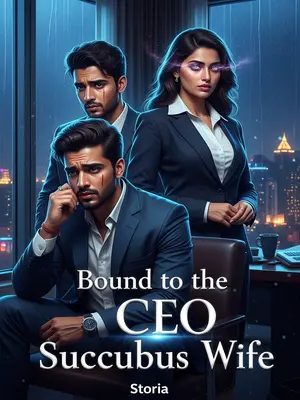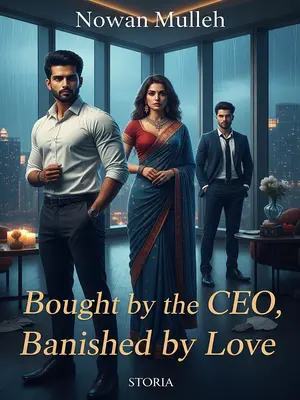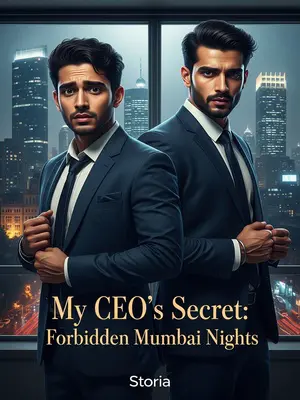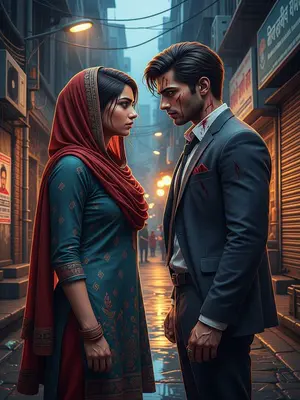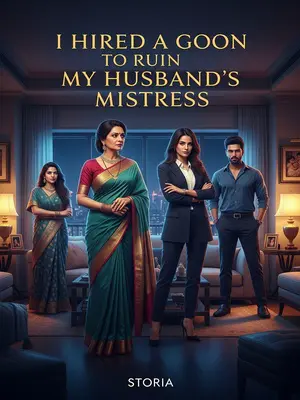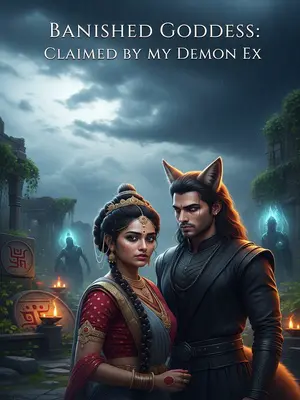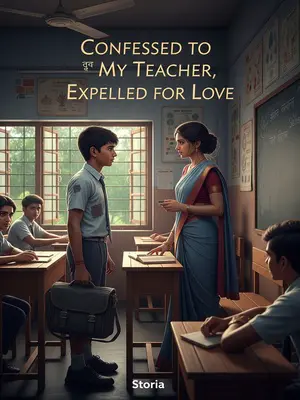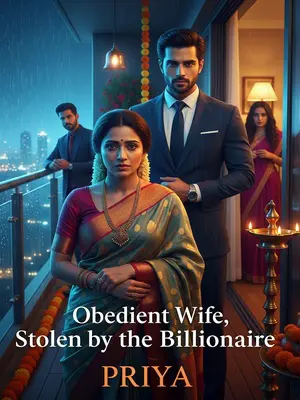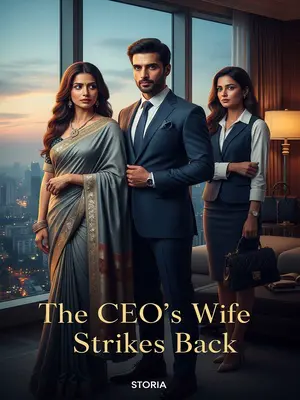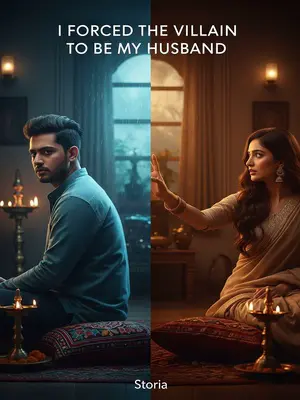Chapter 3: Rain, Room Keys, and Crossing Lines
3
Once, I was sent on a business trip to the 'East Project' with Ananya.
My first outstation project—I barely slept the night before, packing and repacking, checking tickets a dozen times.
She grumbled the whole flight—boss only told her late last night, so she’d barely slept, had to reach Pune airport by five for an 8am flight. In her rush, she forgot her Aadhaar card.
I tried to lighten the mood, cracking a joke about airport samosas, but she just glared. “You boys have it easy,” she muttered, tugging at her dupatta. The whole time, she kept checking her phone, worried about her son’s school pick-up.
Luckily, she got a temporary pass at the airport and made it just in time.
We both sighed in relief when the security finally waved us through. Ananya muttered a quick prayer, then gave me a sheepish smile.
We landed, went straight to the client, hammered out the project. By the time we finished, it was nearly five.
We barely had time for lunch—just poha from a roadside stall, eaten standing up while rain lashed down. My shirt was soaked, but Ananya kept her saree spotless.
At the hotel, the front desk was strict—they wouldn’t let Ananya check in without proper ID. Her airport pass wasn’t enough, they insisted on a police certificate.
The manager, a paunchy uncle with a red tilak and stern face, refused to budge. “Rules are rules, madam,” he said in broken English. Ananya’s patience wore thin; she called her husband, then her boss, but nothing worked.
Ananya pleaded: “Can’t I use my temporary ID? Or a digital copy?”
She showed every card in her purse, even tried calling a friend in the police. The receptionist, bored, was unmoved. The faint smell of agarbatti drifted from the lobby shrine, mixing with the dampness of wet earth.
But the front desk was unmoved.
Finally, she slumped into a lobby chair, muttering curses in Kannada. I tried to cheer her up, but she waved me away, eyes tired.
I offered to use my own ID to book another room, but no luck—“Sir, must match name on booking,” the manager repeated, barely glancing at me. I felt useless, watching Ananya grow more frustrated by the minute.
Just then, the client called for dinner, so we went to eat first.
The restaurant was noisy, full of families celebrating. Ananya barely touched her food, lost in thought. I tried to keep it light, but she only managed a faint smile.
Halfway through, Ananya stood to toast everyone, announcing she’d have to catch a flight home that night.
Her toast was brief, voice tired. She thanked the client, made her excuses, and gathered her things. I walked her out, feeling awkward.
I helped with her suitcase, saw her off in an auto.
She didn’t even say goodbye, just nodded and shut the door. I watched the auto disappear into the rain, then trudged back inside.
That night, I drank with the client, then went out for jalebi.
The sweet syrup stuck to my tongue, mixing with the bitterness of the day. City lights blurred as I wandered, half-drunk, half-lonely.
Around midnight, I staggered back to the hotel, about to crash when my phone buzzed—Ananya.
The ringtone jolted me, cutting through my foggy brain. I squinted at the screen, sure I was imagining things.
She said she was at the hotel entrance, asked me to come down.
Her voice was quiet, almost embarrassed. I pulled on slippers and hurried, still not quite sober.
Wasn’t she supposed to have flown home? Was I dreaming?
But there she was, standing in the lobby, suitcase in hand, looking both relieved and exhausted. The lobby smelled of fresh agarbatti and wet carpet.
I hurried over: “What happened?”
Her saree was damp, hair sticking to her forehead. She managed a weak smile, clutching her phone like a lifeline.
Ananya sighed: “All flights cancelled because of rain. I had no choice but to come back to you.”
She sank into a chair, rubbing her temples. The rain had grounded every flight, leaving her stranded. I felt a surge of sympathy—and a flutter of excitement.
I was stumped. Without her ID, she couldn’t check in.
It was past midnight, the city shrunk to just us two in the bright lobby. The ceiling fan hummed, and the security guard gave us a long look.
Ananya sat in silence, then bit her lip: “Arjun, is your room a twin?”
Her eyes flickered, weighing every word. My heart skipped a beat.
I nodded, hesitated, looked at her, unsure.
I glanced at the reception uncle, then back at her, awkward but determined to help.
She just grunted and sat, saying nothing.
For a moment, neither of us spoke. The rain thudded against the glass, matching my heartbeat.
I thought and said: “Didi, how about this—I’ll give you my room, and I’ll try to book another one next door.”
I tried to sound practical, but inside I was nervous. Would she think I was being cheap, or worse, creepy?
She looked at me, eyes softening: “Are you sure?”
Her tone was gentler, almost grateful. I nodded, trying to look mature.
I said: “I’ll try. If not, I’ll crash in the lobby or find a dharamshala.”
I joked about the hard beds in Indian guesthouses, hoping to make her smile. It worked—a little.
So I took her to my room, started packing up.
She hovered near the door, arms crossed, watching as I stuffed my socks and shirts in my bag.
Ananya, a bit anxious, said: “You drank a lot, and it’s pouring outside. Have some chai to sober up before you go?”
She pointed at the electric kettle. Her voice was gentle, almost caring. I nodded, grateful for the excuse to stay longer.
That made sense, so I brewed Assam tea the client gave me and sat across from Ananya, sipping slowly.
We sat in silence, listening to the rain. The tea was strong and fragrant, warming me from inside. For a moment, the world felt peaceful.
Ananya started talking—about work, about her family. As she spoke, she wiped her eyes with the back of her hand—clearly, there were issues with her husband.
Her voice trembled as she spoke of her son, the loneliness of living apart from her husband, the pressures of being a working mother. I listened, not sure what to say, just hoping my presence helped.
I said: “Didi, your husband’s a co-founder of a tech company. That’s impressive.”
I tried to sound encouraging, but she only sighed, eyes clouding over.
Ananya’s face darkened: “He’s just one of the founders, and the laziest.”
She laughed bitterly, shaking her head. I realised even the most perfect families had cracks underneath.
I’d drunk too much—my stomach churned, head heavy. I slumped in my chair, listening to her like a lullaby, nodding off. I don’t remember anything after that.
The room spun as I tried to focus. The last thing I saw was her tucking a blanket around me.
The next morning, I woke up to find Ananya lying beside me.
Sunlight filtered through curtains, casting soft shadows. I blinked, disoriented, only to see her beside me, hair mussed, face peaceful.
She was on her side, eyes open, gazing at me, hair half covering her face, looking especially alluring.
Her lips curled into a faint smile. My heart skipped a beat—this felt like a scene from a movie, unreal and magical.
We locked eyes, neither saying a word for a long moment.
The silence was heavy, but not uncomfortable. I felt a strange sense of intimacy, as if we’d shared a thousand secrets in the night.
Finally, Ananya threatened: “Arjun, if you dare tell anyone about last night, I’ll thappad you.”
Her voice was playful, but her eyes were serious. I grinned, raising my hands in surrender.
I replied: “Of course not, Didi. I’m not mad!”
I tried to sound cool, but my voice squeaked. I prayed she didn’t notice.
Ananya snorted: “You tell Meera everything. Can’t keep your mouth shut.”
She flicked my forehead, mock-accusing. I laughed, rubbing the spot where her finger landed.
Even though it was a twin room, the beds were close, making it extra awkward.
There was barely a hand’s width between us. I could smell her shampoo—a mix of jasmine and something else.
I joked: “Didi, was I well-behaved last night?”
I waggled my eyebrows, hoping to lighten the mood. She snorted, but I could see her lips twitching.
Ananya rolled her eyes: “You slept like a buffalo. Snored so much I couldn’t sleep.”
She mimicked my snoring, making me laugh. The tension eased, replaced by something warmer.
I teased: “You must’ve been on guard against me, that’s why you couldn’t sleep.”
I nudged her, only half-joking. She shot me a glare, but her eyes danced.
Ananya glared: “Arjun, warning hai—maybe I’m too lazy to go to the police station for a certificate, but if I have to drag you there, I won’t hesitate!”
Her tone was strict, but affection peeked through. I grinned, scooting away.
The blanket slipped off, and I nearly fell off the bed. We both burst out laughing, the awkwardness finally breaking.
Ananya seemed pleased, then beckoned: “Come here. Tell the truth—are you and Meera really just colleagues?”
She raised an eyebrow, waiting, voice soft, almost vulnerable.
I raised my hand and swore: “Absolutely nothing with Meera Didi. She got me this job, that’s all. We’re just coworkers.”
I made the sign of a promise, like I used to with my little sister. I hoped she’d believe me this time.
Ananya looked half-convinced: “Really?”
She leaned in, searching my face for a lie. I held her gaze, willing her to trust me.
I nodded vigorously: “Swear on God. If I’m lying, may lightning strike me.”
I even looked up, hoping no thunder would crash. She giggled, finally relaxing.
Ananya’s expression softened. She asked: “Arjun, how many girlfriends did you have in college?”
Her tone was teasing, but I sensed genuine curiosity. I hesitated, then answered honestly.
I sighed: “Not a single one. Four years undergrad, three post-grad—waste hi waste.”
I shrugged, pretending not to care, but the disappointment was real.
Ananya snickered: “Yeah, right. Who’ll believe that?”
She nudged me, laughter infectious. For a moment, we were old friends, not colleagues dodging office politics.
That morning, we chatted in bed for a while, had lunch together, then headed home.
We took the same auto to the airport, talking about everything and nothing. For once, the world outside felt less complicated.

